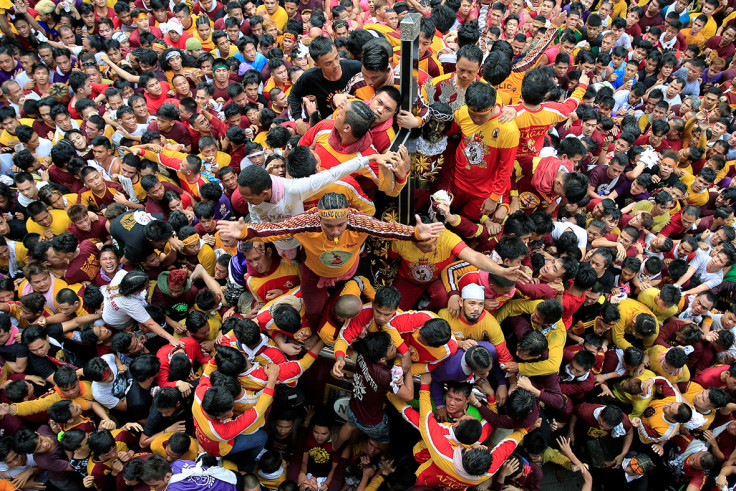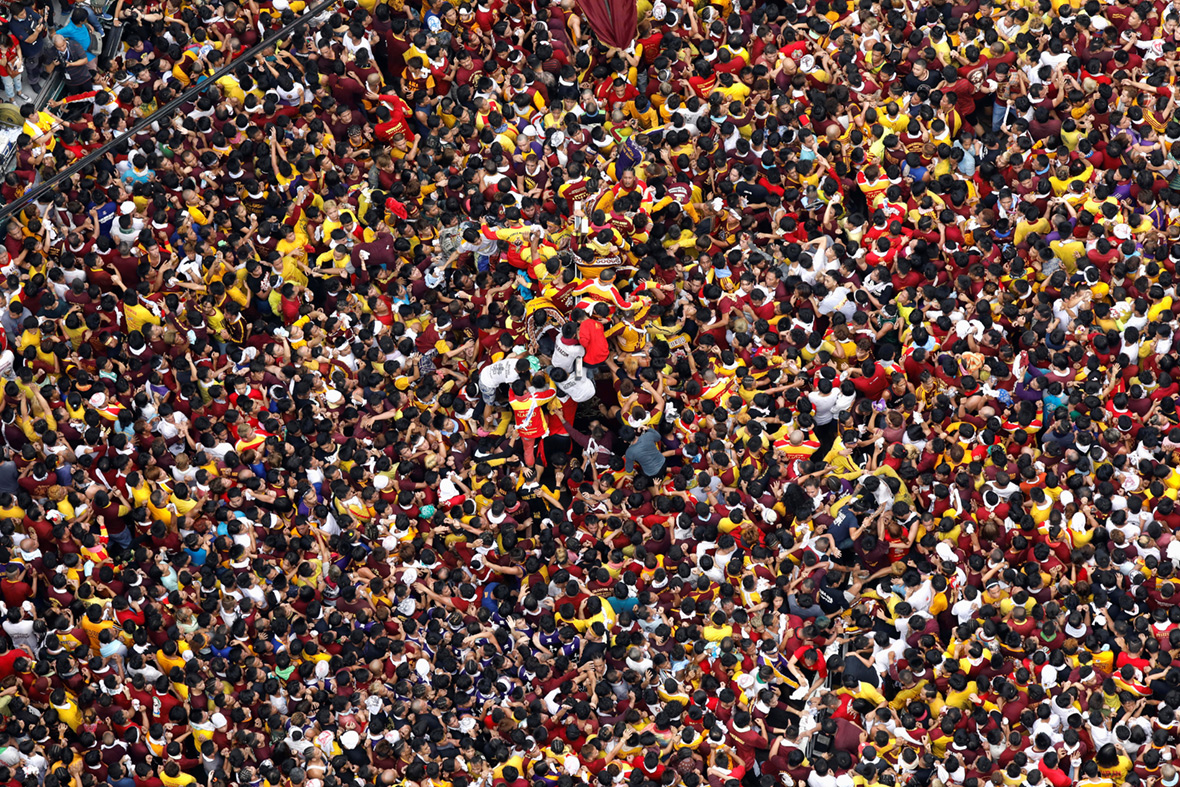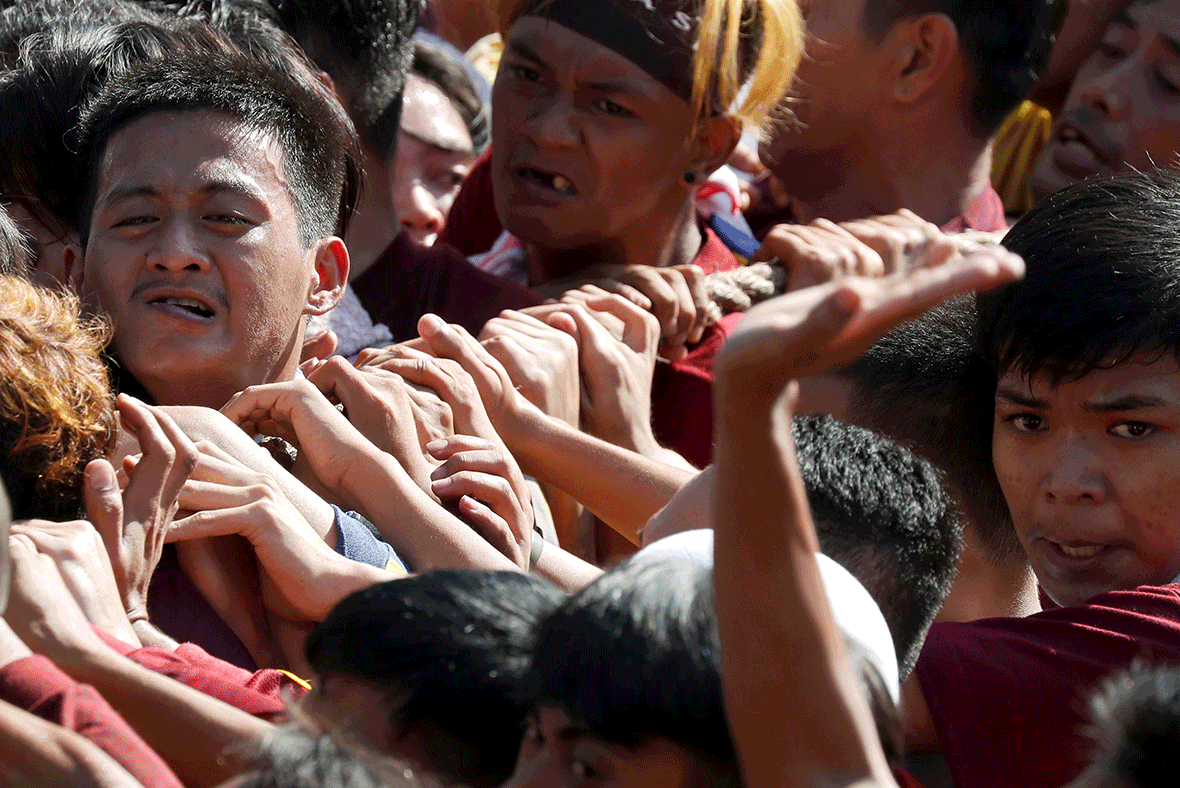Chaotic scenes as huge crowds of Catholics clamour to touch 'healing' black Christ statue in Manila
Devotees squeezed into the mob and climbed on others in a desperate attempt to reach the Jesus of the Black Nazarene in Manila.
Enormous crowds of Catholics clamoured to touch a centuries-old black statue of Jesus Christ believed to have healing powers as it was transported through the streets of Manila in a chaotic procession.

Devotees squeezed their way into the tightly packed mob around the carriage carrying the life-size statue. Some climbed over others in attempt to touch the statue. Others threw small towels at volunteers on the carriage to wipe parts of the cross and the statue in the belief that the Nazarene's powers would cure ailments and foster good health and fortune.
Crowned with thorns and bearing a cross, the Nazarene statue is believed to have been brought from Mexico to Manila on a galleon in 1606 by Spanish missionaries. The ship that carried it caught fire, but the charred statue survived. Some believe the statue's endurance, from fires and earthquakes through the centuries and intense bombings during World War Two, is a testament to its powers.









The spectacle reflects the unique brand of Catholicism, which includes folk superstitions, in Asia's largest Catholic nation. Dozens of Filipinos have themselves nailed to crosses on Good Friday in another tradition to emulate Christ's suffering that draws huge crowds each year.
The parade began at dawn and may last until evening or even longer. By mid-afternoon, more than 700 devotees had been treated by Red Cross volunteers, mostly for minor injuries and ailments and exhaustion. Security officials said they were concerned with possible stampedes during the event that some say can draw millions, although it's difficult even to approximate the crowd size. Devotees have died in the crush in previous years.


The Associated Press interviewed a couple of devotees at this year's procession. Ronald Malaguinio, a 38-year-old worker, carried a small replica of the Nazarene on a steel platform bedecked with yellow and white flowers for several kilometres from his home in Manila's Tondo slum district to join the procession and pray for a son recovering from a heart ailment. "If the doctor says your son has a 50-50 chance of surviving, where do you go?" he asked. "If money can't cure diseases, the only other option is prayers. Ours have been heard and we're here to thank the Nazarene."
Another devotee, Jeffrey Nolasco, told AP he joined the procession for the fifth year in a row to pray that his four children will finish school, his impoverished family could eat three times a day and he could overcome a bad habit. "I'm a drunkard," said Nolasco, who walked barefoot on the hot pavement and carried a small statue of the cross-carrying Nazarene.



The parade was held under extra-tight security after the Philippines came under a disastrous militant attack last year. Although the police and military said they had not monitored any specific threat, they deployed more than 6,000 personnel, including snipers and bomb squads backed by a surveillance helicopter and drones, to secure the annual procession. Authorities imposed a gun ban, mobile phone signals were jammed sporadically in the vicinity of the procession and a team of bomb experts walked sniffer dogs along the route ahead of the mammoth crowd. Concrete barriers blocked the route, partly to prevent the kind of attacks that have been witnessed in Europe, where Islamic radicals have rammed vehicles into crowds, a military official said.
Hundreds of local and foreign militants laid siege for five months last year to the city of Marawi, leaving more than 1,100 combatants and civilians dead in the worst Isis-linked attack so far in Asia. Troops crushed the uprising in October, but an unspecified number of extremists managed to escape and other extremist groups in the country's south still pose threats.






